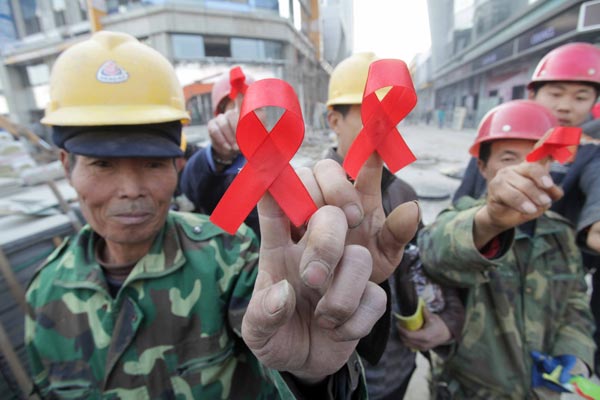 |
| Migrant workers at a construction site in Weifang, Shandong province, on Saturday, display red ribbons, signifying solidarity with HIV/AIDS patients. Volunteers gave them brochures on AIDS prevention on the eve of World AIDS Day. Zhang Chi / for China Daily |
Premier Li calls for bigger roles for volunteers and social groups
The HIV/AIDS epidemic is hitting Chinese at a younger age, as the country's leaders call to speed up efforts to fight the disease.
The proportion of HIV/AIDS sufferers who are young almost doubled between 2008 and 2012, and gay sex is considered a major reason for the increase, said Shang Hong, director of the HIV/AIDS key lab under the National Health and Family Planning Commission.
According to the commission, China has so far detected 434,000 people living with HIV/AIDS. More than 3,000 are between 15 and 18.
From January to September, newly detected cases stood at about 70,000, and nearly 90 percent were transmitted sexually.
On Sunday, World AIDS Day, President Xi Jinping called on the public to eliminate discrimination and help provide timely and effective treatment and support for HIV carriers and AIDS patients.
Premier Li Keqiang said that the battle against the epidemic remains "tough and complicated" and called for a bigger role for volunteers and social organizations.
Shang said the situation among the young people deserves particular attention.
"Of all HIV/AIDS cases reported last year, 1.7 percent were youths aged between 15 and 24, up from the 0.9 percent in 2008, and the trend that the virus is hitting younger people has been on the rise," she said.
Notably, among sufferers who were college students, 95 percent were male and 70 percent contracted HIV via male-to-male sex, she said.
"Sex education with a focus on HIV/AIDS prevention and control urgently needs to help address the problem," said Zhao Yan, deputy director of the AIDS treatment and care division of the National Center for AIDS and Sexually Transmitted Disease Control and Prevention.
Colleges and universities have gradually recognized the issue and become more open about safe sex and HIV/AIDS prevention on campus, she said.
Zhao Kai, a student volunteer committed to HIV/AIDS prevention education at Shanghai Jiao Tong University, said college students are entitled to such knowledge delivered in an interesting and fun manner.
He led a volunteer team to design and introduce activities to raise awareness on campus such as a charity sale, lectures and group readings.
"They learn to protect themselves from HIV/AIDS while having fun," said Zhao Kai.
Worldwide, more than 2 million people between 10 and 19 are living with HIV, and many do not receive the care and support that they need to stay in good health and prevent transmission, according to a statement issued by the World Health Organization before World AIDS Day.
In addition, millions more adolescents are at risk of infection, it warned.
"Adolescents face difficult and often confusing emotional and social pressures as they grow from children into adults," said Gottfried Hirnschall, director of the WHO HIV/AIDS Department.
"Adolescents need health services and support, tailored to their needs. They are less likely than adults to be tested for HIV and often need more support than adults to help them maintain care and to stick to treatment," he said.
Craig McClure, chief of HIV programs at UNICEF, said that about one-seventh of all new HIV infections occur during adolescence.
"Unless the barriers are removed, the dream of an AIDS-free generation will never be realized," he said.
In response, the WHO recommended governments review their laws to make it easier for adolescents to obtain HIV testing without needing consent from their parents.
Wu Zunyou, director of the National Center for AIDS and Sexually Transmitted Disease Control and Prevention, said the country will constantly improve testing and treatment services, particularly for youth.
An exclusive interview with Steven Kraus, Director of UNAIDS Asia and the Pacific, on the 26th World AIDS Day:
• Alarm as HIV cases soar among men who have sex with men
• Asia and the Pacific needs more funds to fight AIDS
• HIV stigma, discrimination remain widespread in Asia-Pacific region
• More efforts needed by Asia-Pacific countries to create an AIDS-free generation
• China's fight against AIDS gains 'huge progress'
• Full text of interview with Steven Kraus, Director of UNAIDS Asia and the Pacific
 Heavy cargo flights taking off
Heavy cargo flights taking off In pictures: PLA's digital equipment
In pictures: PLA's digital equipment  Americans mark Thanksgiving Day with parades
Americans mark Thanksgiving Day with parades Self-made farmer billionaire donates 69 villas at hometown
Self-made farmer billionaire donates 69 villas at hometown Demolition of bizarre rooftop villa in Beijing still in progress
Demolition of bizarre rooftop villa in Beijing still in progress Service seminar for E China train attendants
Service seminar for E China train attendants  Supermodel-turned-designer
Supermodel-turned-designer Cheerleaders light up CBA regular season
Cheerleaders light up CBA regular season  Finland--anytime you want is right time to go: Ambassador
Finland--anytime you want is right time to go: Ambassador Youths in Night club: photo story
Youths in Night club: photo story Models dazzle at Int'l Yacht Model Pageant
Models dazzle at Int'l Yacht Model Pageant  How to apply for a green card in China
How to apply for a green card in China Selected sports photos of the week
Selected sports photos of the week Annual Santa Claus parade held in Canada's Montreal
Annual Santa Claus parade held in Canada's Montreal China's aircraft carrier passes through Taiwan Strait
China's aircraft carrier passes through Taiwan StraitDay|Week|Month